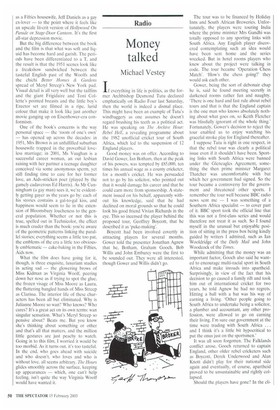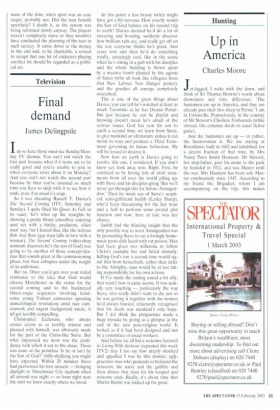Radio
Money talked
Michael Vestey
If everything in life is politics, as the former Archbishop Desmond Tutu declared emphatically on Radio Four last Saturday, then the world is indeed a dismal place. This might have been an example of Tutu's windbaggery as one assumes he doesn't regard brushing his teeth as a political act. He was speaking on The Archive Hour: Rebel Hell, a revealing programme about the 1982 unofficial cricket tour of South Africa, which led to the suspension of 12 England players.
Good money was on offer. According to David Gower, Ian Botham, then at the peak of his powers, was tempted by £85,000, ten times his annual wage as a county cricketer, for a month's cricket. He was persuaded not to go by his solicitor, who pointed out that it would damage his career and that he could earn more from sponsorship. A statement issued on his behalf, apparently without his knowledge, said that he had declined on moral grounds so that he could look his good friend Vivian Richards in the eye. This so incensed the player behind the proposed tour, Geoffrey Boycott, that he described it as 'puke-making'.
Boycott had been involved covertly in attracting players for several months. Gower told the presenter Jonathan Agnew that he, Botham, Graham Gooch, Bob Willis and John Emburey were the first to be sounded out. They were all interested, though Gower and Willis didn't go. The tour was to be financed by Holiday Inns and South African Breweries. Unfortunately, the players were touring India where the prime minister Mrs Gandhi was totally opposed to any sporting links with South Africa. Any English player discovered contemplating such an idea would have been sent home and the series wrecked. But in hotel rooms players who knew about the project were talking in code. The tour became 'Operation Chess Match'. 'How's the chess going?' they would ask each other.
Gower, being the sort of debonair chap he is, said he found meeting secretly in darkened rooms rather fun and naughty. 'There is one hard and fast rule about rebel tours and that is that the England captain is the one man who knows absolutely nothing about what goes on, so Keith Fletcher was blissfully ignorant of the whole thing.' Fortunately, Gower's decision to reject the tour enabled us to enjoy watching his graceful stroke play for England thereafter.
I suppose Tutu is right in one respect, in that the rebel tour was clearly a political issue even if it shouldn't have been. Sporting links with South Africa were banned under the Gleneagles Agreement, something the then prime minister Margaret Thatcher was uncomfortable with but which her government had signed. So the tour became a controversy for the government and threatened other sports. I remember the tour well because BBC radio news sent me — I was something of a Southern Africa specialist — to cover part of it. BBC sport took the official line that this was not a first-class series and would therefore not treat it as such. So I found myself in the unusual but enjoyable position of sitting in the press box being kindly guided by writers I admired, such as Ian Wooldridge of the Daily Mail and John Woodcock of the Times.
While admitting that the money was an important factor, Gooch also said he wanted to encourage multi-racial sport in South Africa and make inroads into apartheid. Surprisingly, in view of the fact that his decision to go caused a family rift and took him out of international cricket for two years, he told Agnew he had no regrets. Hitting a ball with a bat was his way of earning a living. 'Other people going to South Africa to undertake being a solicitor, a plumber and accountant, any other profession, were allowed to go on earning their living. I'm sure our government at the time were trading with South Africa ... and I think it's a little bit hypocritical to put the onus just on the sportsmen.'
It was all soon forgotten. The Falklands conflict arose, Gooch returned to captain England, other older rebel cricketers such as Boycott, Derek Underwood and Alan Knott didn't play for their national side again and eventually, of course, apartheid proved to be unsustainable and rightly collapsed.
Should the players have gone? In the cli mate of the time, when sport was an easy target, probably not. Did the tour benefit apartheid? I doubt it, as the system was being reformed slowly anyway. The players weren't completely naive or they wouldn't have conducted the planning of the tour in such secrecy. It came down to the money in the end and, to be charitable, a refusal to accept that one lot of cricketers playing another lot should be regarded as a political act.



































































 Previous page
Previous page